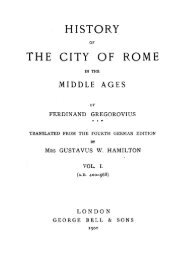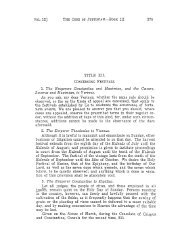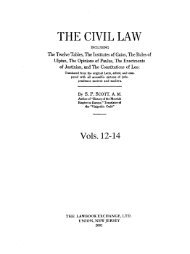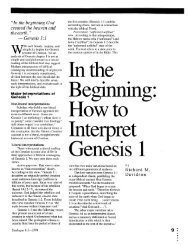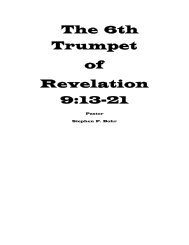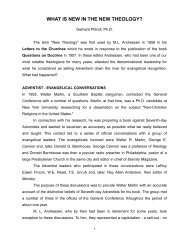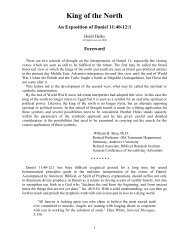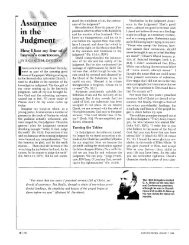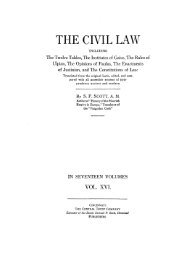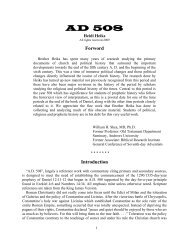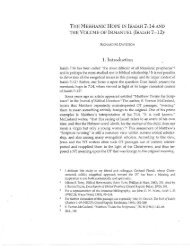You also want an ePaper? Increase the reach of your titles
YUMPU automatically turns print PDFs into web optimized ePapers that Google loves.
<strong>Judgment</strong> <strong>in</strong> <strong>Daniel</strong> 7Thepreterist <strong>in</strong>terpretationof<strong>Daniel</strong> 7 argues thatAntiochus Epiphanesis the fulfillment of the little horn of this chapter. This not only requireshis identification as the persecutor of God's people, but it alsorequires that the div<strong>in</strong>e court be called <strong>in</strong>to session sometime dur<strong>in</strong>g hisreign to judge him, lift his persecution of the Jews, and take away hisdom<strong>in</strong>ion. Aside from problems <strong>in</strong> historical fulfillment discussed below,the scale of heavenly participation <strong>in</strong> this session of the div<strong>in</strong>e courtappears too grand for just Antiochus. Someth<strong>in</strong>g scaled down to the orderof Ahab's judgment from the heavenly court (see 1 Kgs 22) would havebeen adequate and appropriate <strong>in</strong> Antiochus' case.The preterist <strong>in</strong>terpretation conjectures that the motive for the writ<strong>in</strong>gof this prophecy was to give the Jews courage to endure persecutionand strength to throw off the yoke of their oppressor. Hartman andDi LelIa's recent Anchor Bible volume, The Book ofDanie~ provides anexample of this k<strong>in</strong>d of application to the passage. 11The Son ofman <strong>in</strong> this school ofthought is identified with thesa<strong>in</strong>tsespeciallythose who have endured Antiochus' persecution. As a result ofthe judgment, the k<strong>in</strong>gdom that was to be given to the sa<strong>in</strong>ts should havebeen realized <strong>in</strong> the Maccabean k<strong>in</strong>gdom. Unfortunately, the Maccabeanrulers were far from sa<strong>in</strong>tly, and their k<strong>in</strong>gdom lasted less than a century,not the "for ever, for ever and ever" of the prophecy (7:18).Any resemblance between the picture ofthejudgmentof<strong>Daniel</strong> 7 andits <strong>in</strong>tended results and what actually transpired <strong>in</strong> the history ofPalest<strong>in</strong>e<strong>in</strong> the second century B.C. is purely co<strong>in</strong>cidental. Ifthe unknown author of<strong>Daniel</strong> (so this school of thought) wrote his work while rid<strong>in</strong>g the crest ofa wave ofenthusiasm result<strong>in</strong>g from the liberation and purification ofthetemple late <strong>in</strong> 165 B.C., then perhaps he can be forgiven for his excesses <strong>in</strong>his unfulfilled expectations! The last glimmer ofany such hopes be<strong>in</strong>g realizedas a result ofthese developments <strong>in</strong> the second century B.C. flickeredout with the Roman conquest <strong>in</strong> 63 B.C., a century before Jesus ascendedto heaven.Those <strong>in</strong>terpreters who would apply <strong>Daniel</strong> 7:13-14 to Jesus' experienceat the time of His ascension <strong>in</strong> AD. 31 (while pagan Rome ruled theNear East), are caught upon the horns of a dilemma: If they accept thepreterist po<strong>in</strong>t ofview (which moves the whole framework of <strong>Daniel</strong> 7 toan earlier time), then the div<strong>in</strong>e court should have met <strong>in</strong> session and bestowedthe k<strong>in</strong>gdom upon the Son ofman <strong>in</strong> thesecond century B.C. Ifthey11 Hartman and Di Lelia, The BookofDanie~ Anchor Bible (1978), 220.141



